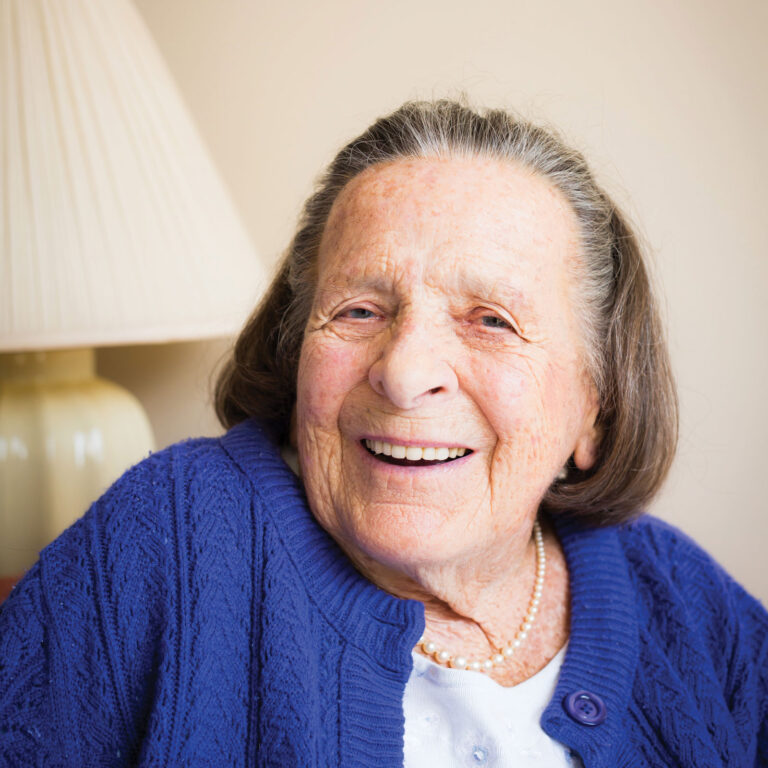Sarah Stevens made Williston Academy a home to a generation of boys, and over more than two decades worked with her husband, Phillips, to transform the institution.

Bill Harmon ’57 was settled on Loomis. But he and his father decided to give Williston Academy a look before making a final decision. On a Saturday morning, then-headmaster Phillips Stevens personally guided Mr. Harmon around the campus.
“Having the headmaster give us a tour on a Saturday morning, it was impressive,” Mr. Harmon says. “Phil was almost larger than life, he was very tall, and he looked like a superman at the time to us younger guys.”
But the person who left the greatest impression on Mr. Harmon was Sarah Stevens. In contrast to her husband, Mr. Harmon says Mrs. Stevens “had a braid wrapped around her head and looked like someone from a prior era.” When he met her inside the Homestead, the couple’s house on campus, she made it clear she hoped Mr. Harmon would attend.
“It was a feeling that she just really wanted me here,” he says. “This idea that someone was really interested in wanting me at the school—it was a good feeling.”
Mr. Harmon changed his mind. Williston Academy, it was.
Mr. Harmon isn’t the only one with a Mrs. Stevens story. Generations of boys, who dubbed Mrs. Stevens their “den mother,” recall her support, compassion, and kindness. To many, arguably she’s one of the most beloved figures in Williston Northampton’s history.
“We’ve always celebrated her just because we love her,” Peter Hewes ’58 says. “Because she was a lot like our mothers, we really kind of cherish her.”
Mr. and Mrs. Stevens served the Williston community for more than 20 years, from 1949 to 1972. When the couple moved to campus, Mrs. Stevens carved out her own role. She organized teas with sandwiches and cocoa, taught boys to mind their manners, and she consoled them when they were sick, even taking it upon herself to notify parents if their child spent a night in the infirmary. She raised four of her six children at the Homestead, finding time to attend student events or drag them out to view the aurora borealis. Next to Mr. Stevens’ stern exterior, she offered a more gentle tone, though she was a stickler for niceties.
“I said it was important for the boys to know how to drink a cup of cocoa or a cup of tea and be social,” she said during a recent interview. “I insisted they wore their ties when they came to tea. If someone said, ‘Mrs. Stevens, I don’t have a necktie,’ I’d say, ‘Borrow one from somebody.’” Mr. Harmon says those ties “were a pain in the neck, no pun intended. But if she spoke about it, the last thing you wanted to do was not listen.”
On Sunday nights, Mrs. Stevens invited seniors for dinner, going down the class list alphabetically so as not to play favorites. Using two irons, she cooked golden brown waffles, to which she added bowls of salad. On one infamous night, she recalls pouring maple syrup over the salad instead of the waffles.
“She was always there with cookies and punch and teaching us to drink tea properly,” Mr. Hewes recalls. “She had a pleasant, playful nature about her. She was never the authoritarian figure. We knew that she cared about us. We could feel that. Boys need that, especially growing boys.”
When Dick Brady ’58 received an invitation for dinner at the Homestead, he says, “I thought I had done something wrong.” But he quickly found out that wasn’t the case. “Mrs. Stevens made it special. She was considered a mother to 300 boys.”
Mrs. Stevens called the boys “her Willies.” And 43 years after Mr. and Mrs. Stevens left Williston, her Willies still have a fondness for her. A group of alumni always invites Mrs. Stevens to their Wildcat Weekends every year, and they take turns escorting her to the dinners.
“I didn’t know I was especially dear to them,” she says of the surprise she felt after being invited to the alumni dinners. “It’s wonderful for me to know that they still want me to come, even though I can’t hear half of what they say.”
Why the steadfast dedication that’s spanned decades?
“She was the sweet, compassionate woman who saw us as young boys away from home,” Mr. Hewes says. “I don’t know anyone who doesn’t revere that woman and truly love her.”
This story appeared in the Fall 2015 issue of the Bulletin.
